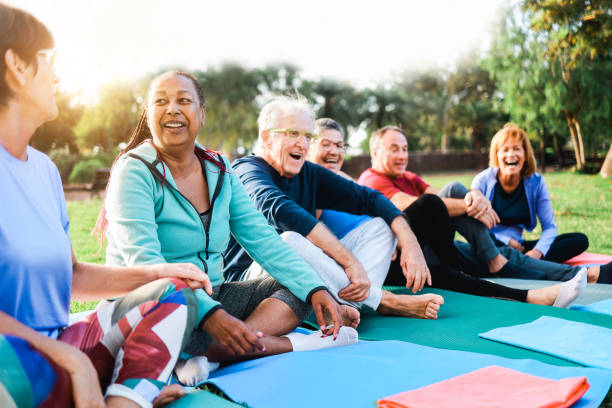Yoga, with its profound emphasis on mind-body connection and gentle movements, has become a beloved practice for people of all ages. In this article, we will dive into the various styles of yoga, highlighting their benefits and considerations for older practitioners. Whether you are a seasoned yogi or new to the practice, let’s embark on a journey to find the perfect blend of tranquility and vitality!
Understanding the Diversity of Yoga
Yoga is a versatile practice that offers an array of styles, each tailored to cater to different needs and preferences. Some of the popular types of yoga include:
1. Hatha Yoga: Hatha yoga forms the foundation for many modern yoga styles. It is a gentle and accessible practice that focuses on basic postures, breathwork, and relaxation. Hatha yoga is an excellent starting point for older individuals who may be new to yoga or prefer a slower-paced practice.
2. Vinyasa Yoga: Vinyasa yoga is characterized by flowing sequences of poses, where movements are synchronized with the breath. While it can be invigorating, it may not be the best choice for older practitioners with limited mobility or joint issues, as it involves dynamic movements and transitions.
3. Yin Yoga: Yin yoga is a meditative and passive practice that involves holding seated or reclined poses for an extended period. It targets deep connective tissues and is well-suited for older individuals seeking enhanced flexibility and relaxation.
4. Restorative Yoga: Restorative yoga focuses on deep relaxation and stress relief. It uses props like bolsters and blankets to support the body in gentle postures, making it ideal for older practitioners seeking therapeutic benefits.
Benefits of Yoga for Older Individuals
Regardless of the style, yoga offers an array of benefits that resonate particularly well with older practitioners:
- Improved Flexibility: Yoga gently stretches and lengthens muscles, promoting flexibility and reducing stiffness often associated with aging.
- Enhanced Balance and Stability: Many yoga poses require balance, helping older individuals maintain stability and reduce the risk of falls.
- Joint Health: Yoga’s low-impact nature is kind to joints, making it an ideal exercise for older adults with arthritis or other joint-related issues.
- Stress Reduction: Yoga’s mindful practices, such as meditation and controlled breathing, can help alleviate stress and promote mental well-being.
- Social Connection: Joining yoga classes fosters a sense of community and provides opportunities for older individuals to connect with like-minded people.
Choosing the Right Yoga Style
Selecting the best yoga style depends on individual preferences, physical condition, and fitness goals. Here are some essential considerations for older individuals:
Health Status
If you have any pre-existing health conditions or injuries, it’s crucial to consult with your healthcare provider before starting any new exercise regimen, including yoga.
Physical Abilities
Consider your current fitness level and any mobility limitations when choosing a yoga style. Gentle styles like Hatha, Yin, and Restorative yoga are generally more accommodating for older practitioners.
Personal Preferences
Some individuals may enjoy a more dynamic practice like Vinyasa, while others might prefer the soothing pace of Yin or Restorative yoga. Listen to your body and choose a style that resonates with you.
Instructor Experience
Look for experienced yoga instructors who are knowledgeable about working with older practitioners. Their guidance and modifications can make a significant difference in your yoga journey.
Safety Tips for Older Yogis
Safety should always be a priority in yoga practice, especially for older individuals:
- Begin each session with a gentle warm-up to prepare your body for the practice ahead.
- Don’t hesitate to use props or modify poses to suit your comfort and needs. Yoga is about finding the right balance between challenge and ease.
- Listen to your body and avoid pushing yourself beyond your limits. Discomfort should not be confused with beneficial stretching.
- Stay hydrated before, during, and after your yoga practice, especially in warmer environments.
In your quest to find serenity and embrace the numerous benefits of yoga, remember that age should never hinder your pursuit of wellness. The beauty of yoga lies in its adaptability, making it an ideal practice for older individuals seeking physical vitality and mental tranquility. Whether you find solace in the grace of Hatha yoga, the flow of Vinyasa, the serenity of Yin, or the restoration of Restorative yoga, trust that your yoga journey will be as unique and fulfilling as you are. Embrace the transformational power of yoga, and let it guide you towards a life of harmony, balance, and timeless well-being. Enroll in a yoga class at YogaWorks or CorePower Yoga to get started.
Yoga for seniors:
